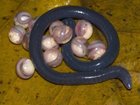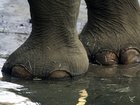More than 50 million years ago, the Earth was a hotter place than it is today and horses the size of pet cats roamed the forests of North America, U.S. scientists said on Thursday.
These earliest known horses, known as Sifrhippus, actually grew smaller over tens of thousands of years in order to adapt to the higher temperatures of a period when methane emissions spiked, possibly due to major volcanic eruptions.
 Full Story
Full Story
A new species of lizard with striking iridescent rainbow skin, a long tail and very short legs has been discovered in the rainforest in northeast Cambodia, conservationists announced.
Scientists named the skink Lygosoma veunsaiensis to honor theVeun Sai-Siem Pang Conservation Area in Rattanakiri province where it was found, Conservation International (CI) said in a statement.
 Full Story
Full Story
Australian researchers Thursday revealed they had filmed a pod of extremely rare Shepherd's beaked whales for the first time ever.
The Australian Antarctic Division team was tracking blue whales off the coast of Victoria state last month when they spotted the reclusive mammals, which are so rarely seen that no population estimates of the species exist.
 Full Story
Full Story
Theories that men will eventually become extinct because the Y chromosome which determines maleness is shrinking are quite wrong, according to a gene study published on Wednesday.
The men-are-doomed scenario leapt to prominence nearly a decade ago when scientists found that the male chromosome had dramatically shriveled.
 Full Story
Full Story
A European experiment that in September showed particles moving faster than the speed of light has been exposed as a mistake due to a faulty wire connection, the U.S. journal Science said Wednesday.
"A bad connection between a GPS unit and a computer may be to blame," said the report on the magazine's website section Science Insider, citing "sources familiar with the experiment."
 Full Story
Full Story
An astronaut attempting to visit recently discovered planetGJ1214b would land in hot water -- literally, U.S. scientists say.
Researchers at the Harvard-Smithsonian Center for Astrophysics said they have identified an entirely new kind of planet, dominated not by rock, gas or other common materials, but water.
 Full Story
Full Story
Researchers digging through mud in northeast India have discovered a new family of legless amphibians in a rare scientific breakthrough detailed in a study released on Wednesday.
The family of burrowing, tailless creatures was identified by scientists working for five years in remote Indian states including Sikkim, Arunachal Pradesh and Nagaland.
 Full Story
Full Story
Paleontologists working in the United Arab Emirates have uncovered elephant footprints that are seven million years old, making them the oldest of their kind and possibly the longest preserved track way in the world.
The find, reported on Wednesday in the British journal Biology Letters, was made at a site called Mleisa 1, in the UAE's Baynunah Formation, a geological outcrop dated to the Late Miocene.
 Full Story
Full Story
A Japanese construction firm claimed Wednesday it could execute an out-of-this-world plan to put tourists in space within 40 years by building an elevator that stretches a quarter of the way to the moon.
Obayashi Corp claims it could use carbon nanotube technology, which is more than 20 times stronger than steel, to build a lift shaft 96,000 kilometers (roughly 60,000 miles) above the Earth.
 Full Story
Full Story
Fruit seeds stored away by squirrels more than 30,000 years ago and found in Siberian permafrost have been regenerated into full flowering plants by scientists in Russia, a new study has revealed.
The seeds of the herbaceous Silene stenophylla are far and away the oldest plant tissue to have been brought back to life, according to lead researchers Svetlana Yashina and David Gilichinsky of the Russian Academy of Sciences.
 Full Story
Full Story



